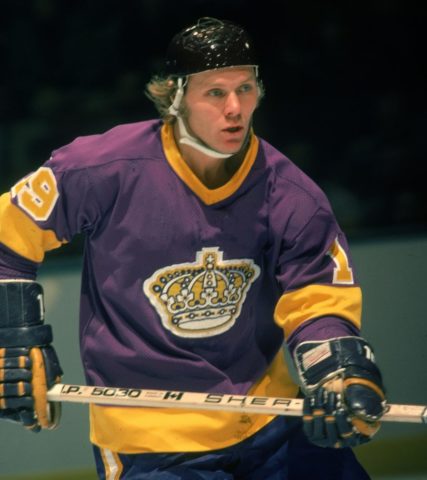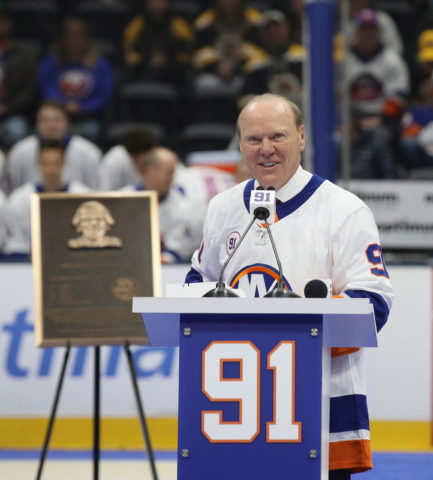There have been 1,152 players dealt at the NHL Trade Deadline since 1979-80. But only the New York Islanders found the missing piece that led to a dynasty.
At the 1980 NHL Trade Deadline, the Islanders sent two solid NHL veterans, forward Billy Harris and defenseman Dave Lewis, to the Los Angeles Kings for Butch Goring, a speedy center. It’s the kind of trade that will have contending teams hoping for the one deal that will put them over the top at this year’s trade deadline on April 12.
But the Goring trade did more than just help the Islanders win the Stanley Cup for the first time since entering the NHL in 1972: It also turned them into a dynasty — one that won the Cup four years in a row, nearly got No. 5 and set an NHL record that may never be broken with 19 consecutive series victories.
“As we now know, you can say it was a pretty good trade,” Goring said years later with a laugh. “It’s because we didn’t just win one; we started a dynasty of some sort.”
Second-Line Sensation
As the 1980 NHL Trade Deadline approached, Goring was a 29-year-old who had spent his entire NHL career with the Kings, had a long-term contract with them, and was a fan favorite because of his speedy, scrappy style of play.
But the Islanders, who had dethroned the Montreal Canadiens as regular-season champions in 1978-79, were showing the effects of their upset loss to the New York Rangers in the 1979 Semifinals. They played in fits and starts for the first five months of the 1979-80 season, plagued by the hangover from their loss the previous spring.
General manager Bill Torrey made some roster tweaks as his team struggled. But he refrained from making any major moves until just before the deadline, when he sent Harris and Lewis, two career Islanders, to the Kings. Coming to Long Island was Goring, a player Torrey hoped would give the Islanders someone who could center a second scoring and take some of the heat off the big line of Bryan Trottier, Clark Gillies, and Mike Bossy.

The ”Trio Grande” was one of the NHL’s top lines. But without a capable No. 2 center to back them up, the Islanders struggled as opponents loaded up their best defenders against what was basically a one-line offense.
“I knew we had the nucleus of a championship team,” Torrey remembered. “But I also knew the roster needed some fixing. After Trottier I needed another center — but a really good one was hard to find, at least at that time.”
Even though he was going from a middle-of-the-pack team to one with championship aspirations, Goring wasn’t exactly thrilled to be headed to the Island.
Happy in L.A.
“I had signed a six-year deal with the Kings — I think I was in the second year — so I really wasn’t expecting to go anywhere. At least I was hoping not to go anywhere,” he said. “My initial reaction was one of anger and disappointment.”
Goring felt a lot better after taking a look at his new team.
“I got here and I realized I was going to an awfully good hockey club,” he said. “That made it a lot easier to handle. This was a team that had a chance to win a Stanley Cup. Once I was able to get the emotions out of it, I realized it was a tremendous opportunity. In L.A., we were pretty much a .500 hockey club.”
Goring was helped by the fact that he had skated with two of his new teammates earlier in his career.
“I had played with (goalie) Billy Smith and (defenseman) Jean Potvin in Springfield (the Kings’ AHL affiliate) — we actually won the Calder Cup there in 1971. So at least I knew a couple of people,” he said. “That made the adjustment a little bit easier.
“I actually didn’t have much conversation with Bill or (coach) Al (Arbour) when I got here. I was 29 years old; there were not going to be any surprises on my end. I knew the organization and how they played. I knew Al’s style, how he coached. I knew what he expected. On the other side of the coin, they knew what they were getting. I had been around for a while and established a certain style of play — and results. Both parties were like, ‘Let’s go do this.'”
Perfect Fit
Goring fit in so well on the ice that the Islanders didn’t lose again in the regular season, winning eight of their final 12 games and tying the other four. His personality was also a hit with his new teammates.
“Butchie had that personality where he’s really outgoing, and we didn’t have a lot of guys that were really outgoing,” center Lorne Henning remembered years later. “He’s a funny guy, can laugh at himself. He became part of the dressing room right away, and I think it helped our group to relax a little. He had no trouble fitting in. He slid right in behind Trots and then was perfect in the room.”
The on-ice success made it a lot easier for Goring to fit in on a largely homegrown team that generally had eschewed major deals — Harris was the first draft pick in franchise history in 1972, and Lewis was a second-rounder in 1973. Each had spent their entire career on Long Island, so the decision to trade them set off shock waves.

“People forget about the guys who left were very good players,” Goring said. “More than that, there were a lot of friendships on this hockey club. It’s not always easy to be accepted into a team, regardless of your abilities. It’s about the friendships that are acquired over the years. Two guys left — and for the guys who stayed behind, it was tough for them.
“You’ve got to be accepted by your teammates, so you’ve got to be able to fit into their swing of things. Then you’d like to have some success, both as an individual and team-wise. If you can do all those things, it makes the trade much easier.”
Torrey said the arrival of defenseman Ken Morrow after he helped the United States “Miracle On Ice” team win the gold medal at the 1980 Lake Placid Olympics enabled him to make the trade.
Morrow’s Arrival Was Key
“The Kings had no trouble scoring, but they needed a defenseman and they wanted Dave Lewis,” Torrey said. “I couldn’t have made the trade and given up Lewis without seeing that Morrow could step into the lineup, which he did.”
Less than three months after the deal, Goring was a Stanley Cup champion. By the next spring, when he won the Conn Smythe Trophy as playoff MVP, he was a fan favorite. He still is.
Goring is well aware of how his fortunes — and those of the Islanders — were altered by one trade.

“I’m not saying that trade was the reason we won four (Cups),” he said, “but the fact of the matter is that they made a trade and they ended up winning four.”
Goring did pretty well too — not only did he earn four Stanley Cup rings, his No. 91 was retired by the Islanders on Feb. 29, 2020, and he’s in his 11th season as the analyst on Islanders telecasts. More than 40 years later, the “Goring trade,” as it’s known on Long Island, is still one of a kind — and one that any number of teams would love to duplicate at this year’s deadline.